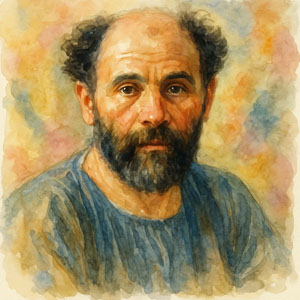— Gustav Klimt
 Born and raised in Vienna, painter Gustav Klimt (1862–1918) was a successful muralist when he shifted his creative vision following the death of his brother and artistic collaborator Ernst in 1892. Klimt began to experiment with portraits and established the Secession Movement, Austria’s Art Nouveau.
Born and raised in Vienna, painter Gustav Klimt (1862–1918) was a successful muralist when he shifted his creative vision following the death of his brother and artistic collaborator Ernst in 1892. Klimt began to experiment with portraits and established the Secession Movement, Austria’s Art Nouveau.
"All life is an experiment," observed philosopher Ralph Waldo Emerson.
Klimt lived at a turbulent time of change and new ideas, when Sigmund Freud's intellect observed: "Illusions commend themselves to us because they save us pain and allow us to enjoy pleasure instead. We must therefore accept it without complaint when they sometimes collide with a bit of reality against which they are dashed to pieces."
Klimt’s paintings celebrated eroticism in gold and silver as he vividly experimented with colors, florals, and textures. His independence challenged the conventions of his time. He was controversial, but developed a unique and recognizable style.
Enjoying pleasure, Klimt was an enormous man, robust, with a voracious appetite. His work celebrated human sensuality and desire. His most celebrated work, The Kiss (1907–08), was called "painted pornography" as the golden oil explored the human psyche and sexuality. Influenced by Byzantine mosaics, Klimt united desire with joy and blossoming nature.
"When we share," Freud said, "that is poetry in the prose of life."
More Art & Artists Quotations

 Sometimes to
Sometimes to